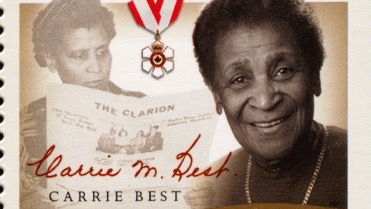Source- New York Public Library
https://digitalcollections.nypl.org
Creative Commons CC0 1.0 Universal Public Domain Dedication (“CCO 1.0 Dedication”)
Anna Greenup, born Anna Hurd on May 5, 1874, in Harveysburg, Ohio, was an influential figure in early 20th-century Canadian history. As the co-founder and first president of the Coloured Women’s Club of Montreal, Greenup played a pivotal role in organizing and empowering Black women in Canada. Her legacy lives on today, not just in the Black community but in the broader fight for civil rights and racial equality in Canada.
Early Life and Education
Anna Greenup’s childhood was steeped in the values of community and education. Born in Harveysburg, a small abolitionist village in Ohio, Greenup came from a family deeply committed to education and social justice. Her father, Charles Hurd, was a schoolteacher, minister, and Civil War veteran, while her mother, Mahala Jackson, was a guiding figure in the family. Raised in a community where education was a significant focus, Anna attended school until the age of 14 before beginning her career as a schoolteacher.
Her early years in Ohio laid the foundation for her strong belief in the power of education and community organization—values that would later influence her work in Canada.
Moving to Montreal and Becoming a Community Leader
In 1900, Anna Greenup married Charles Harvey Greenup, and the couple moved to Montreal, where they settled in the Faubourg Saint-Antoine neighbourhood, now known as Petite-Bourgogne. This area was home to many Black families, particularly those who worked on the railroad, including Anna’s husband, who worked various jobs in the railway industry.
At the time, Black Canadians faced immense challenges, including discrimination in employment, housing, and access to services. Black women, in particular, were excluded from organizations run by white women, which limited their opportunities for advocacy and support. Faced with these difficulties, Anna Greenup and six other African American women founded the Coloured Women’s Club of Montreal (CWCM) in 1902, later renamed in 1904. The CWCM was the first Black women’s organization in Canada and served as a platform to address the needs of the Black community in Montreal.
Under Anna’s leadership as the club’s first president, the CWCM became a vital institution for providing support to the community. The organization established soup kitchens, provided housing assistance, and distributed clothing and blankets to immigrants of Caribbean and African American origin. Through these initiatives, the CWCM laid the groundwork for future Black activism in Montreal.
In 1907, several members of the CWCM, including Greenup, helped establish the Union Congregational Church, a key institution in Montreal’s Black community. The church continues to serve as an important part of the city’s African Canadian heritage.
Anna’s Later Years and Health Struggles
Around 1910, Anna and her husband moved to Vancouver, where Charles worked as an inspector for the Canadian Pacific Railway. Unfortunately, Charles passed away in 1920, and the couple’s only child died at a young age. Despite these personal losses, Anna remained active in Vancouver’s Black community. She was involved in several organizations, including the Universal Negro Improvement Association and the Women’s Mispah Bible Class, where she took part in organizing social events.
In 1931, due to declining health, Anna Greenup was admitted to Essondale Psychiatric Hospital in British Columbia. She continued to receive visitors, including notable figures like Rosa Pryor, the first Black woman to own a business in Vancouver. In 1948, Greenup moved to a provincial home for the elderly in Vernon, British Columbia, where she spent her final years before passing away from cancer on March 15, 1952.
Legacy and Recognition
Anna Greenup’s impact on the Montreal Black community is still felt today. The Coloured Women’s Club of Montreal remains an important institution in the city, carrying forward her mission of community support and empowerment. Her niece, Elsie Lam, continued Greenup’s work, eventually becoming president of the CWCM in the late 1950s.
In recognition of Greenup’s legacy, several initiatives have been named in her honour. In 1997, the Quebec government established the Anne-Greenup Solidarity Prize to recognize individuals or organizations that fight against racism and promote civic action. Additionally, the Habitations Anne-Greenup, a social housing project in Montreal, was inaugurated in 2004, further cementing her enduring influence on the community.
Through her tireless work as an advocate for Black women and her leadership in Montreal’s Black community, Anna Greenup broke barriers. She laid the foundation for future generations of activists and community leaders.



